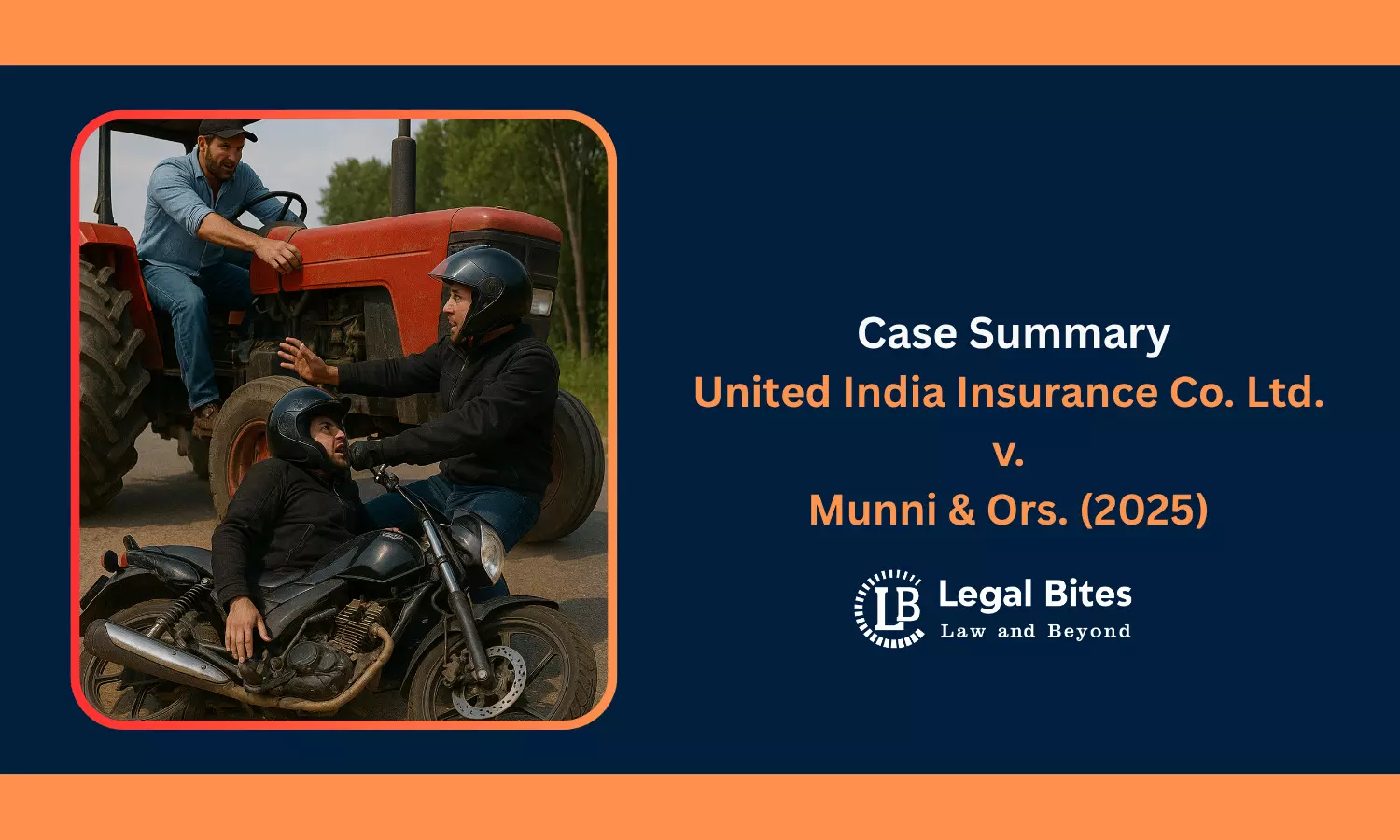Case Summary: United India Insurance Co. Ltd. v. Munni & Ors. (2025) | Motor Accident Compensation
Rajasthan High Court upholds ₹66.38L compensation to the family of a government employee killed in a road accident; rejects insurer's plea for reduced payout.

This case arose from a challenge to an award passed by the Motor Accident Claims Tribunal, Dholpur, awarding compensation for the death of Vinod Kumar in a road accident. The appellant–United India Insurance Co. Ltd. challenged the award on multiple grounds, including the identification of the offending vehicle, the validity of the dependency ratio, and the applicability of the split multiplier in computing compensation.
Title: United India Insurance Co. Ltd. v. Munni & Ors.
Court: Rajasthan High Court, Jaipur Bench
Citation: Civil Miscellaneous Appeal No. 434/2020
Coram: Justice Ganesh Ram Meena
Date of Judgment: 08th July 2025
Factual Background
A. The Accident
On 05 December 2018, Vinod Kumar, aged 58, a Lab Assistant employed in the Education Department, Government of Rajasthan, was travelling from Dholpur to his village Khudila on a motorcycle. At about 6:30 PM near Diholi Shramdan turn on the Dholpur–Rajakhera road, his motorcycle was hit by a tractor (registration No. UP-83-AC-9843), driven rashly and negligently. He sustained grievous injuries and died shortly thereafter.
B. Legal Proceedings
An FIR (No. 165/2018) was registered at PS Dholpur, and after investigation, a charge sheet under Sections 279 and 304A IPC was filed against the tractor driver. The deceased’s wife, children, and mother (respondents 1–5) filed a compensation claim under Sections 166 and 140 of the Motor Vehicles Act, 1988.
The Motor Accident Claims Tribunal, Dholpur, partly allowed the claim and awarded ₹66,38,800/- with 9% interest p.a. from the date of filing the claim petition (16.01.2019), holding both the insurer and tractor owner (respondent No.6) jointly and severally liable.
Tribunal’s Findings
The Tribunal framed four issues and found in favour of the claimants on all counts:
- Involvement of Tractor and Negligence – The tractor was held responsible for causing the accident, supported by eyewitness testimony and documentary evidence.
- Employment and Income of Deceased – The deceased's salary was accepted at a net income of ₹69,230/month.
- Dependency and Multiplier – A dependency factor of 3/4th was applied despite the children being majors; the Tribunal adopted a uniform multiplier of 9.
- Compensation – The final compensation computed was ₹66,38,800/-.
Grounds of Appeal
The Insurance Company challenged the award under Section 173 of the Motor Vehicles Act, arguing:
- The accident vehicle was not conclusively identified.
- Omission of the vehicle’s registration number in early records (Rojnamcha) was fatal.
- Tribunal failed to deduct income tax from salary while calculating net income.
- The dependency ratio of 3/4th was inappropriate as three children were major, one of whom was married.
- The split multiplier method (pre-retirement vs post-retirement income) should have been applied.
- Interest should not have been granted on future prospective income.
- The awarded amount was grossly excessive and should be reduced to ₹35,73,038/-.
Arguments by Respondents
The counsels for the claimants-respondents defended the Tribunal’s award as just and in accordance with law. They supported the:
- Use of a uniform multiplier, relying on recent Supreme Court decisions.
- Consideration of actual dependency, not merely age or marital status.
- Reasonable basis for income computation, including future prospects.
High Court’s Observations and Analysis
Justice Ganesh Ram Meena rejected the insurer’s contentions after detailed scrutiny of the records, evidence, and settled law:
A. Identification of Vehicle and Negligence
- The eyewitness account of Rajesh Sharma (AW-2) was found credible and consistent, corroborated by documents like seizure memo, mechanical inspection, and FIR.
- Mere non-mention of vehicle number in the initial Rojnamcha entry was held not sufficient to discredit the claim.
- The insurance investigator (NAW-1) was not an eyewitness and failed to provide contrary evidence.
Finding: The involvement of the insured tractor in the accident was satisfactorily established.
B. On Split Multiplier Method
- The Court cited the Supreme Court judgment in Maya Singh v. Oriental Insurance Co. Ltd. (2025 SCC OnLine SC 266) which expressly rejected the split multiplier method. The Apex Court held:
- Use of multiple multipliers based on retirement date leads to arbitrariness.
- Instead, a uniform multiplier based on the deceased’s age is to be used, considering full annual income (salary + pension).
Conclusion: Tribunal was correct in applying a uniform multiplier of 9 based on age (58 years), rendering insurer’s objection baseless.
C. Income Tax Deduction
- The insurer failed to produce proof of actual tax deductions or liability.
- Hence, Tribunal was justified in not reducing the salary further for tax.
D. Dependency Ratio and Major Children
The Court relied on the Supreme Court decision in Seema Rani v. Oriental Insurance Co. Ltd. (2025 INSC 192), which clarified:
- Major children, even if married, may remain dependents based on factual financial dependence.
- Legal representatives, even if earning, are entitled to claim compensation.
Conclusion: Applying a dependency ratio of 3/4th was proper in the given circumstances.
E. Computation of Compensation
The appellant’s calculation of ₹35,73,038/- was held to be based on:
- Improper use of split multiplier
- Invalid exclusion of adult dependents
- Faulty deductions
- The Tribunal’s amount of ₹66,38,800/- was held to be fair and as per law.
Key Legal Principles Applied
- Uniform Multiplier Rule – Once the age of the deceased is known, the multiplier is fixed. Post-retirement earnings cannot be speculated or split. [Maya Singh v. Oriental Insurance Co. Ltd., 2025 SCC OnLine SC 266]
- Legal Representative ≠ Dependent – Even if not financially dependent, legal heirs are entitled to apply for compensation. [Seema Rani v. Oriental Insurance Co. Ltd., 2025 INSC 192]
- Proof of Negligence and Vehicle Involvement – Eye-witness testimony supported by documentary evidence is sufficient; minor omissions (like missing registration number in Rojnamcha) are not fatal.
- Future Prospects and Interest – Future prospects form part of the notional income and do attract interest once awarded, unless barred by a specific provision.
Final Judgment
After careful review, the Rajasthan High Court held:
“This Court finds no reason to interfere with the findings of the learned Tribunal. Consequently, the appeal is dismissed, and the Tribunal’s award is upheld as fair, reasonable, and in consonance with the prevailing jurisprudence.”
The appeal by United India Insurance Company was dismissed. The claimants were held entitled to the full compensation as awarded by the Tribunal.
Significance of the Judgment
This judgment is significant for several reasons:
- Reaffirmation of Maya Singh: It firmly reiterates the Supreme Court's rejection of the split multiplier system, promoting uniformity and reducing arbitrary calculations in motor accident claims.
- Protection of Adult Legal Heirs: The Court clarified that even major, married, or earning children may be considered dependents if the factual matrix supports it.
- Insurance Company’s Onus: The ruling re-emphasises that insurers must produce strong rebuttal evidence to avoid liability, and cannot rely on mere technical omissions.
- Victim-Centric Approach: The decision upholds a liberal interpretation of the Motor Vehicles Act to ensure just compensation to the family of the deceased.
Conclusion
Rajasthan High Court's decision in United India Insurance Co. Ltd. v. Munni & Ors. is a textbook application of evolving jurisprudence on motor accident compensation. The judgment strikes a balance between claimants’ rights and procedural rigour, ensuring that justice is not denied on trivial or speculative grounds. By affirming the rejection of the split multiplier and safeguarding the rights of adult dependents, the Court has contributed to a more humane and equitable compensation system.
Click Here to Read the Official Judgment
Important Link
Law Library: Notes and Study Material for LLB, LLM, Judiciary, and Entrance Exams

